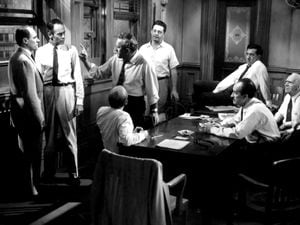Film Talk: Courtroom classic with 12 Angry Men
Stop the presses people! Big news just in – this lad right here LOVES films.

'Tis true dear readers, and I know – you'd never have thought it, right?
All jokes aside, it will come probably as no surprise to most that one of the greatest pleasures I enjoy in life is getting comfy with a genuine nugget of cinematic gold.
Indeed, this column would be in rather poor hands if I didn’t love both going to the flicks and trawling through the back catalogues, discovering and re-discovering some of filmmaking’s greatest contributions to our world.
It’s a passion that, naturally, yields up more than it’s fair share of duds, but in sifting through the dirge, you occasionally find a brick of 24-carat brilliance you had never heard of, or, as in this case, had shamefully long forgotten.
It's time to take a look back at an absolute and truly bona fide classic...
Directed by Sidney Lumet, 1957’s 12 Angry Men was adapted from a 1954 teleplay of the same name by Reginald Rose. A courtroom drama extraordinaire, this masterpiece of moviemaking tells the tale of a jury of 12 men in deliberation over the conviction or acquittal of an 18-year-old defendant who, if found guilty of murder, is facing a death sentence.
Starring Henry Fonda, Lee J. Cobb, Ed Begley, E. G. Marshall, and Jack Warden, 12 Angry Men explores the psychology of how the minority can influence the majority, and the power that one person can wield to elicit change. Shining a spotlight on the emotional and mental pressure experienced by juries, the film almost exclusively uses one set – the deliberation room – where all but three minutes of the flick takes place. In this, the claustrophobic weight of the jury’s responsibility is deliciously evoked within the audience, who are forced into close and closed quarters with the 12 protagonists and compelled to share their experience. And in another genius move, none of the jurors names are revealed until the very end, making it all the easier for the audience to place themselves into their shoes.
Carefully constructed by Lumet, Reginald Rose and Fonda (who produced as well as starred), 12 Angry Men was ready to be received. But how would it fare at the box office?
In a hot and uncomfortable deliberation room of a New York courthouse, 12 jurors hold the fate of an impoverished youth in their hands. Accused of the murder of his father, a guilty verdict will mean a mandatory death sentence. With this, the judge instructs the jury to return a verdict of ‘not guilty’ if they have any reasonable doubt. The verdict must be unanimous.
While the defendant’s guilt seems clear to most, Juror 8 (Fonda) harbours doubts, believing there may be more to the case than first appears. As he expresses his thoughts, other jurors begin to question the circumstances they have been presented with, and the reliability of the evidence in front of them.
The tide begins to turn in the defendant’s favour, but as tensions between the jurors rise, will the real drama of the case be in the verdict or the deliberations themselves?
Though it performed poorly in terms of box office takings, 12 Angry Men was praised by critics who described it as being, among other things, a “tour de force in movie making”, with acting that was “perhaps the best seen recently in any single film”.
Years later, The American Film Institute named Juror 8 as 28th in a list of the 50 greatest movie heroes of the 20th century, and hailed 12 Angry Men as the second-greatest courtroom drama ever made (ranking it only behind 1962’s To Kill a Mockingbird).
Rightly regarded by many as one of the finest flicks ever filmed, 12 Angry Men compels emotional and psychological investiture with a power that few movies possess.
A testament to its brilliance, in 2007 the film was selected for preservation in the US National Film Registry as being “culturally, historically, or aesthetically significant”, and today still stands as one of the industry’s greatest ever creations.





